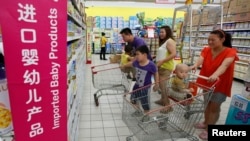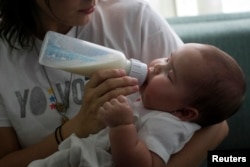A World Health Organization-U.N. Children’s Fund study finds aggressive marketing practices by formula milk companies undermine women’s confidence, discouraging them from breastfeeding their babies.
Some 8,500 parents and pregnant women and 300 health workers in cities across eight countries were surveyed over a three-year period. The report reveals six of the world’s leading manufacturers of baby formula products engaged in systematic and unethical marketing strategies. All are in breach of international standards on infant feeding practices.
World Health Organization scientist and a lead author of the report, Nigel Rollins, says more than half of parents and pregnant women report being bombarded with messages about the benefits of formula milk. He tells VOA industry claims are largely misleading and of dubious scientific veracity.
"There are many, many examples of how, for example, they see scientific terms being used," said Rollins. "Where there are scientific claims in terms of packaging, claims that it will improve brain development, that it will improve growth, that it will improve immunity. Even during the time of COVID.”
Rollins says there is no evidence to substantiate those assertions. He notes new parents may have difficulty judging the truthfulness of marketing claims. He says they want the best for their babies and are vulnerable to messages that promise solutions to day-to-day problems.The survey was conducted in Bangladesh, China, Mexico, Morocco, Nigeria, South Africa, Britain, and Vietnam. In those countries, between 49 percent and 98 percent of women surveyed expressed a strong desire to breastfeed their babies exclusively. However, the report says misleading marketing messages reinforce the difficulties of nursing, undermining women’s confidence in their ability to breastfeed successfully.
The WHO/UNICEF study notes global breastfeeding rates have increased very little in the past two decades. During the same period, sales of formula milk have more than doubled.
Rollins says the health consequences for infants and babies who are not fed with mothers’ milk are serious, especially in low-income countries.
"But, in fact, breastfeeding has a protective effect against mortality even in high-income settings," said Rollins. "But the impact on lifelong health—so, if you think about things like child obesity and child development and maternal health, risk of cancer—those are true for both children and mothers in every setting.”
The report says the baby feeding industry uses promotional gifts, commissions from sales and other inducements to entice health workers in all countries to persuade new mothers to buy their products.The report does not identify any formula manufacturer by name. However, in response to the study, Swiss-based Nestle, the world’s biggest formula maker, told media it was “highly compliant with the WHO Code” and that it was “voluntarily stopping promoting formula for infants 0-6 months across the world by year end.”
The WHO, UNICEF and partners are calling on governments to adopt legislation to end exploitative marketing practices. They add, these laws must be enforced to ensure that the $55-billion industry abides by the landmark 1981 International Code of Marketing of Breast-milk Substitutes.





